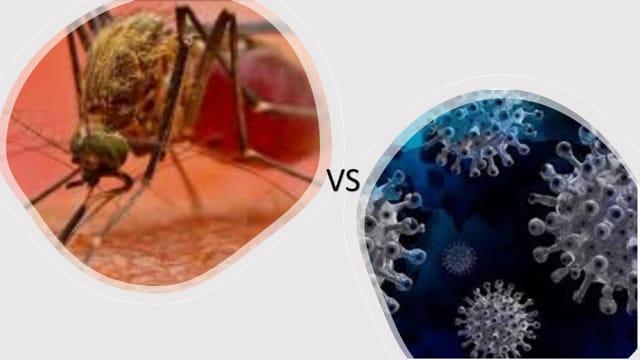When the Coronavirus pandemic hit the world in early 2020, it crippled the healthcare systems of most wealthy nations, including the US and UK. The projection was that it would devastate Africa given her poor and in most cases non-existent healthcare systems and overcrowded accommodations. But miraculously Africa did better than most other continents and are relatively unscathed when compared to the huge death toll in other continents.
Yes, Africa has young populations with robust immune systems but she also suffers much from diseases due to her endemic poverty, which limits access to good healthcare facilities, and quality drinking water. Her endemic poverty means that the quality of life is very poor and given that COVID-19 preys especially on immunocompromised persons, Africa with her myriads of diseases, which already compromised the health of most of her population, stood not a chance.
To complicate things further, malaria, COVID-19 and other diseases found in sub-Saharan Africa, have similar symptoms, which include fever, fatigue, headache, etc. Therefore the potential to misdiagnose COVID-19 is pretty high especially as the healthcare systems in these areas are not as robust as those of the richer nations.
Join our WhatsApp ChannelBut the expected high death rate from COVID-19 in Africa did not materialise. Many reasons have been advanced for this phenomenon, chief amongst them was Africa’s young demographic. A paper published on 25 November 2021 in The Lancet Microbe by a group of scientists working at the Malaria Consortium, Uganda, and which was previously presented at a recent American Society of Tropical Medicine and Hygiene’s annual meeting, might be pointing towards a second reason for the low severity of COVID-19 in Africa.
Africa is endemic to malaria parasites, especially in the sub-Saharan part of the continent. More than 90% of infection and deaths from malaria occur in sub-Saharan Africa, therefore the incidence of multiple infections (e.g. malaria and COVID-19) occurring at the same time is expected to impact negatively on morbidity and mortality rates.
Scientists at the Malaria Consortium, Uganda conducted a study between April and October 2020 with the aim of deciphering the effect of co-infection on morbidity and mortality so as to better understand the potential clinical outcome of co-infections with other diseases.
As Dr Jane Achan, Senior Research Adviser at Malaria Consortium and co-author of the study sees it, “Given the prevalence of malaria in sub-Saharan Africa, understanding the interactions and what this means for patient outcomes is of huge importance, and could help promote integrated approaches to investigations and management. Modelling done at the start of the pandemic predicted the potential consequences of COVID-19 on malaria deaths due to interrupted interventions, but little is known about the impact of co-infection on morbidity and mortality. It was important for us to be able to rapidly respond to a global need and contribute to better understanding the potential clinical implications of co-infections with other diseases like malaria.”
The study, which did not discriminate in age, included a population size of almost 600 patients diagnosed with COVID-19. The level of exposure to malaria at the time of hospitalisation of the patients was measured by determining the immune response to the clinical markers of the parasite, Plasmodium falciparum. Patients showing high immune responses were classified as having high previous exposure to malaria. Conversely patients with little or no immune responses were classified as having low previous exposure to the disease.
The study found that 30% of patients with little or no previous exposure to malaria suffered severe form of COVID-19 compared to about 5% of patients with high previous exposure to malaria.
Cytokines are communicating molecules in your body. They allow the cells in your body to talk to each other and are especially important in immune and inflammatory responses. The researchers profiled the level of cytokines in both patients with current and high malaria exposure, respectively. They found no apparent differences between the two types of patients. The low levels of cytokines seen in this case according to the researchers, suggest a form of regulatory control of the immune system resulting in prevention of severe expressions of COVID-19.
Here’s Dr Achan again, “The results suggest that if you’ve had a high previous exposure to malaria, you’re likely to control or manage COVID-19 better. Previous malaria exposure seems to play a role in the manifestation of COVID-19, possibly at an immunological level. The potential correlation between malaria exposure and COVID-19 may contribute to the reasons why the pandemic has not seen the same number of deaths from COVID-19 as was anticipated across Africa.”
In a similar study with patients co-infected with malaria and Ebola, the reverse was the case i.e. the severity of Ebola was higher in patients with previous high exposure to malaria. In effect, malaria may have a protective effect against severe COVID-19 infection that leads to hospitalisation or death.
But the study is limited in objective. For example viral loads over the course of the study were not monitored for comparisons. The number of people who took part in the study was rather small and needs to be expanded. Age of patients and underlying medical conditions need to be factored in.
However, despite these shortcomings, the study did give the COVID-19 dialogue vis-a-vis the consequential impact in Africa, another dimension.
In another study by researchers from the Malaria Research Training Centre in Bamako, Mali, in association with the US National Institute of Allergy and Infectious Diseases, it was discovered that of over 3,500 community people surveyed by testing their blood for antibodies to Coronavirus, about 59% had been exposed to the virus but the number admitted to hospitals over COVID-19 was very low and in some cases not even a COVID-19 symptom was reported throughout the pandemic.
According to Dr John Woodford, co-researcher, “It’s not that we’re not seeing any markers of disease severity, it is that the rates of reporting of hospitalisations, symptomatic illness, and death are lower than would be expected. Sometimes, several fold lower.”
The study did find that the surveyed communities in Mali had high rates of previous exposure to other Coronaviruses. But there was no evidence to suggest that this previous exposure to other Coronaviruses offered protection against SARS-CoV-2. Therefore, the researchers hypothesised that the low severity of COVID-19 seen in the community was due in part to co-morbidities or high exposure to other diseases, namely malaria. Malaria was suspected as the protecting factor because Mali as a sub-Saharan African country, has a high incidence of malaria, and the earlier study in Uganda as aforementioned, did link malaria to protection against COVID-19.
The researchers further hypothesised that recurrent malaria infection had a modulating effect on the Malian communities’ immune systems such that when their immune systems encounter the COVID-19 virus, they do not overreact and cause inflammation as is common in normal COVID-19 cases elsewhere.
However, the researchers hope to elucidate further the effects of the pandemic in Mali in order to prioritise public health resources to meet the challenges.
A previous study published on 26 April 2021 in the online journal, Frontiers in Medicine, by Rusmini and coworkers reported similar findings that areas in Italy with the highest incidence of malaria infection had lower numbers of COVID-19 cases. The researchers found six genes out of a selection of 47 genes that had potential links between malaria and COVID-19.
That high exposure to malaria confers some kind of protection against COVID-19 is not surprising. Hypertension, which is endemic in Africa, has also been found to have a protective effect on the chances of one developing cerebral malaria.
So, it does seem that one illness can protect against another. But the studies presented here are not definitive. That you have been continually exposed to malaria right from birth does not mean that you are immune to COVID-19. You would still do well to protect yourself, and if you were lucky enough to have a natural immunity or malaria-induced protection against COVID-19, count it as a bonus!



















Perhaps like many people believe, poverty and God go hand in hand. If one is faced with something that is beyond one’s control, one’s best bet is always to look unto God. And Africa in it’s s state had no choice than to lean on Psalm 121. And boy did He come good. We know he is FAITHFUL and He proved Himself TRUE .